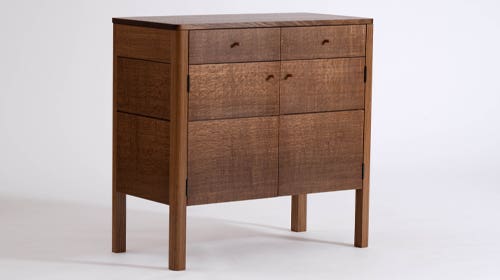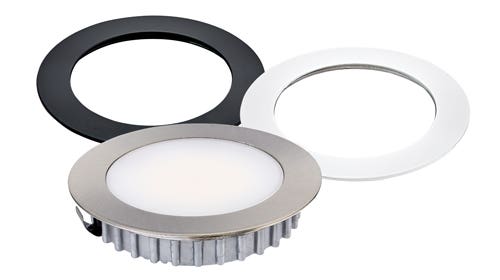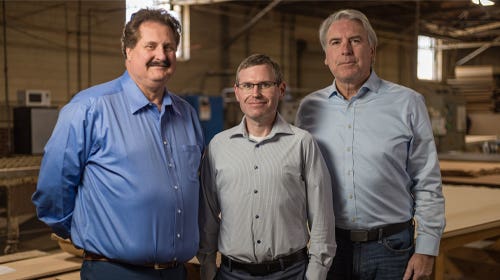Delta brand is on its own once again
Three weeks into his new job as president and chief executive officer of the recently acquired Delta Power Equipment Corp., Bryan Whiffen apologized for missing a scheduled phone interview. His…
Three weeks into his new job as president and chief executive officer of the recently acquired Delta Power Equipment Corp., Bryan Whiffen apologized for missing a scheduled phone interview. His flight had been delayed, he explained, a small nuisance when compared with the challenge of essentially creating a new company and home for the 92-year-old American brand.
"As I explained it to my wife the other day, we're basically trying to jump on board a moving train," says Whiffen.
The train left the station when Chang Type Industrial Co. Ltd., a manufacturing company based in Taiwan, purchased the Delta brand of woodworking equipment and machinery from Stanley Black & Decker in January.
Delta's production lines are being moved from Jackson, Tenn., to Anderson, S.C. Whiffen has been focused on explaining the sale to retailers and customers, finding and creating a new manufacturing space, and contemplating the future of the venerable brand.
"It's our goal - as well as Stanley Black & Decker's goal - to make sure we don't mess up from the customer's perspective," says Whiffen. "We want to make sure the retailers can continue to get merchandise to fulfill their marketing plans and the end users can continue to get parts and service and have access to the Delta products.
"There's a lot of preparation going on at the moment trying to make sure that once that transfer of assets occurs we don't miss anything," Whiffen said in early February. "The time is very short. It's very short window for us to pull all of this off, get all of the equipment moved and up and running in order to ensure that supply chain continuity, so that's our challenge."
Norm MacDonald has also joined the company as an executive vice president and chief operating officer. Previously, Whiffen and MacDonald have worked for Techtronic Industries North America (usually called TTI) and have been responsible for manufacturing and marketing such brands as Ryobi, Milwaukee and Ridgid.
Chang Type will own 100 percent of Delta Power Equipment Corp. The deal also includes the Beisemeyer brand of T-square fence systems. Chang Type manufactures power tools for what's now the competition, including the Craftsmen, DeWalt, Ryobi and Black & Decker brands. Whiffen played down concerns about possible conflicts of interest.
"I think the channels of distribution are so dramatically different that there's not a real problem," he says. "First of all, one of their biggest customers is Black & Decker, the one selling the brand to us. I can't imagine they've got a problem with it. As far as the other customers go, I'm sure there's going to be a little bit of in-depth conversation occurring over the next couple weeks."
Once fully operational, the South Carolina facility will include manufacturing, research and development, engineering, sales and administrative functions.
"Anderson County and the state of South Carolina were very cooperative and very interested in locating the company here. We did not buy the building that the assets are currently in. Black & Decker has other plans for that [Tennessee] facility so we had to move it somewhere. South Carolina desperately needs the jobs and they were very eager to talk to us.
"We're investing in a nice facility as far as manufacturing goes. I need to make that facility as profitable as possible. We're actually looking for opportunities to put other products in there that make sense."
It's fair to wonder if Delta can flourish without its association to Porter-Cable. The two brands have been closely linked since the 1980s. Whiffen believes Delta will be stronger on its own.
"I think that woodworking tools and equipment suffer when they're thrown into a melting pot with cordless drills, circular saws and other much higher volume products," he says. "Other than Black & Decker's introduction of the Unisaw, there hasn't been a ton of real extreme product development in a major name brand company, especially in Delta for several years.
"I love the Unisaw. I applaud Black & Decker for the work they did on the Unisaw. It's a fantastic saw. I'd like to use that as a springboard to grow the brand, help us determine where to position the other new products that we're going to bring to market as far as look, feel and quality. I'm excited about it."
Delta was founded in 1919 by Herbert Tautz working out of his one-car garage in Milwaukee. The scroll saw and Handi-Shop - a combination lathe, disc sander and scroll saw - were among the brand's earliest innovations. Delta began producing band saws in the 1930s and invented the 10" tilting arbor saw, the Unisaw, in 1937.
Rockwell Mfg. Co. purchased Delta in 1945, followed by Pentair in 1981. Pentair consolidated Delta with Porter-Cable and created a 425,000-sq.-ft. distribution center for both brands in Jackson. In 2005, Black & Decker purchased Delta and Porter-Cable, expanding its woodworking portfolio that also included DeWalt. Stanley Works merged with Black & Decker in 2009 to create Stanley Black & Decker.
Now Delta stands on its own once again.
"I think it's a good story, personally," adds Whiffen. "We've seen a lot of consolidation in the last 10 to 12 years in the industry with Black & Decker buying up everybody TTI wasn't and vice versa.
"Seeing a power tool company become independent again of a big conglomerate, I think, is a good thing, especially when that company is a tried-and-true woodworking equipment company. I think we'll be able to bring some things to it that never had a chance as part of a larger pool of brands."
This article originally appeared in the March 2011 issue.







